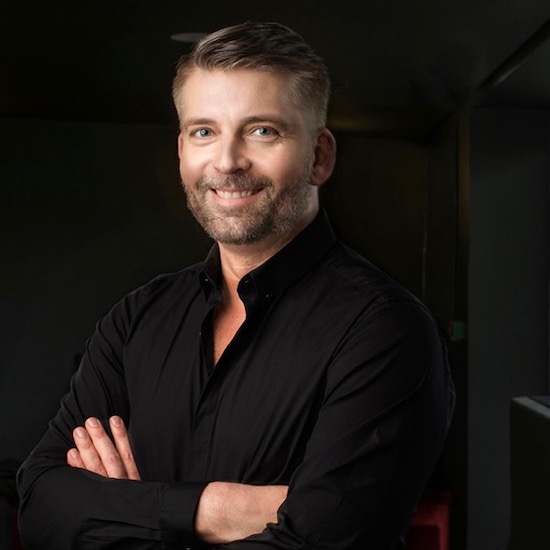Strong artists, uneven music make for mixed New World program

Matthias Pintscher is one of Europe’s most prominent contemporary composers. Currently director of Paris’ Ensemble Intercontemporain and creative partner with the Cincinnati Symphony, Pintscher also has pursued a flourishing international conducting career. He has become a regular guest at the New World Symphony’s Sounds of the Times concerts and, on Saturday night, Pintscher was on the podium for that enterprising series’ latest streaming program, filmed at the New World Center.
The featured event was the United States premiere of Pintscher’s NUR, a piano concerto written in 2018 for pianist-conductor Daniel Barenboim and Berlin’s Boulez Ensemble. The terrifically gifted Israeli pianist Inon Barnatan was soloist for this performance.
Pintscher is a resolutely atonal composer but his scores are expertly crafted with a real affinity for showcasing the individual sonic qualities of orchestral instruments. That said, NUR is not one of Pintscher’s more successful creations. NUR means “fire” in both Arabic and Hebrew but only in the 28-minute work’s final pages is the keyboard writing equal to the title. After an attention-grabbing horn solo and some exquisite piano lines accompanied at times by harp, the first movement (which takes up nearly half the score) tends to ramble and lose focus.
The two remaining sections find Pintscher closer to top form. A Bartók-like “night music” pervades the slow movement. Almost despite his predilections, Pintscher introduces a resplendent solo horn theme midway through the movement, like an update of Brahms, and the clarinet sounds a nocturnal aura. The pianistic pyrotechnics of the final movement suggest the Prokofiev of the more unhinged concerto finales and three wartime sonatas. The concerto’s ending is sudden and effective in its abruptness. Throughout the score, Pintscher’s ear for orchestral colors and timbres is strongly evident.

Like the late Peter Serkin (although very different in temperament), Barnatan’s versatility extends from idiomatic Bach and Mozart to big-boned readings of romantic repertoire and technically immaculate performances of works by high modernist composers. He was the perfect exponent of Pintscher’s challenging work. From the most delicate keyboard patterns and sonorities to the rapid octaves of the coda, Barnatan was in total command of the score. Playing with commitment, enthusiasm and the interpretive imagination, Barnatan brought uncompromising demands to glowing life.
Leading the 21-member ensemble, Pintscher was a master at eliciting his individual orchestral effects. The flutter of Katherine Velasquez’s bass flute and Scott Leger’s numerous horn solos took special honors. All that was missing was the cheering ovation that would have followed the performance had an audience been present.
Despite its unevenness, NUR was definitely the best offering on the 75-minute program. On the low-end count Mnemosis, a 2012 score by George Lewis. The ringing gong effects were the best part of 14 minutes of howls and growls, leavened briefly by a flute solo reminiscent of Ravel’s Daphnis and Chloe. Lewis’ piece was probably more interesting for the musicians to prepare than to listen to.
Marcos Balter’s Bladed Stance is a six-minute meditation for six players. Inspired by the mass shooting Sandy Hook school tragedy, Balter’s score is mournful, replete with timbral contrasts. Indeed, the Brazilian composer proves that minimalism need not be devoid of emotion. Despite the highly distanced stage arrangement, Pintscher managed to blend the instruments into a coherent sonic picture.
Pintscher described Brot by Enno Poppe as “jazz through German binoculars” which fairly captures the score’s combination of unison moments and organized chaos, like a notated jam session. If Poppe’s vision was less than authentic, it proved diverting. With high brass writing carrying the momentum, Corbin Castro’s horn and Morgen Low and Guangwei Fan’s trombones shone impressively. In the crucial rhythmic underlining, pianist Wesley Ducote and the hard- working percussionist Marcelina Suchocka frequently took the spotlight.
Pintscher will conduct Wagner’s Siegfried Idyll on the New World Symphony’s final webcast of the season in June.
Edwin Outwater conducts the New World Symphony in Gabriella Smith’s Riprop, Christopher Cerrone’s The Night Mare, Giancarlo D’addona Castro’s Festival Quintet, Viet Cuong’s Wax and Wire and PaviElle French’s Requiem for Zula with the composer as vocal soloist. Webcast 7:30 p.m. April 17 nws.edu
Posted in Uncategorized
Leave a Comment
Sun Apr 4, 2021
at 12:45 pm
No Comments






